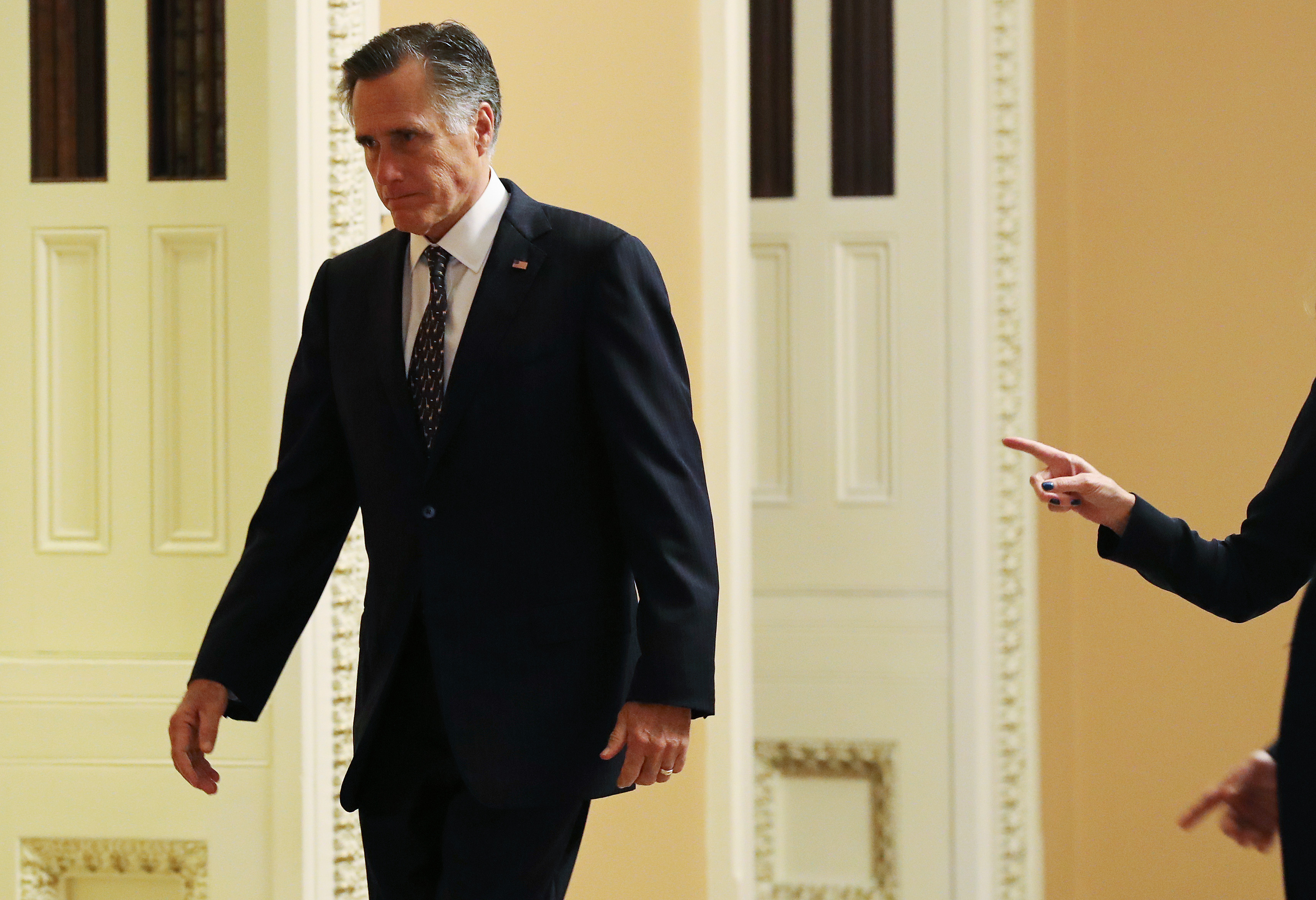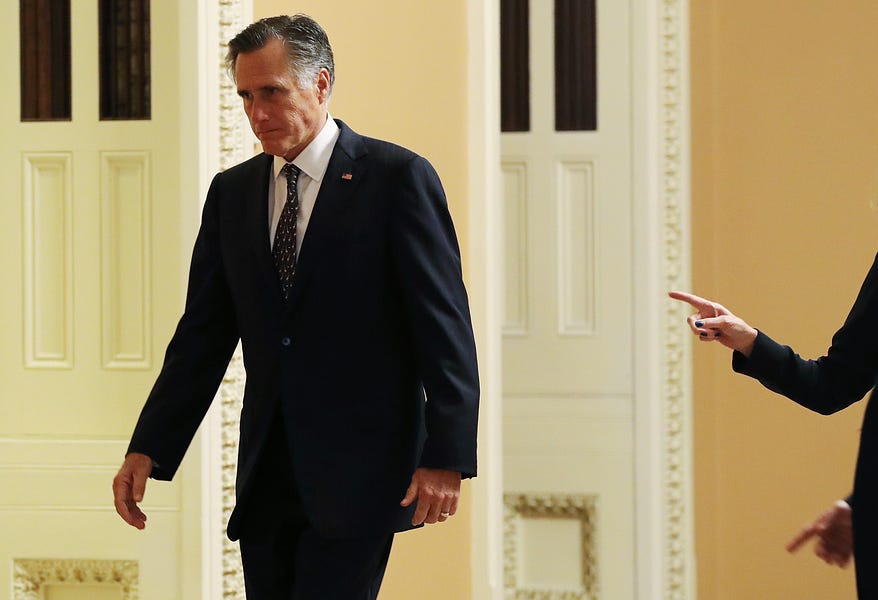This piece is adapted from Thursday’s The Morning Dispatch newsletter. If you don’t already receive it, sign up here. Since sending the newsletter, we’ve heard from the office of one senator who wanted to clarify his position. We’ll update this again if we hear from others.

For weeks, if not months, President Trump’s acquittal at the culmination of the impeachment saga was all but assured. No matter how many leaks damaging to the president’s case surfaced, no matter how many witnesses testified contradicting the administration’s line, no matter how often Rudy Giuliani opened his mouth, Trump had in his corner the 34 Republican senators necessary (and then some) to block his removal from office.
Yet when it came time for senators to cast their votes Wednesday, we still stared—bug-eyed—at the C-SPAN feed on our laptops like Michael Bluth opening a brown paper bag from the freezer labeled “DEAD DOVE Do Not Eat!” and immediately lamenting, “Well, I don’t know what I expected.”
Trump was acquitted on both counts: abuse of power and obstruction of Congress.
But precisely because we knew how Wednesday would play out, we decided to dig deeper and find a more interesting story. Although 52 and 53 Republican senators voted to clear President Trump on the two charges, they did not all reach that conclusion in the same way.
Over the past several days, we’ve dug into each Republican member of the Senate’s public statements on impeachment to determine whether they believe—despite voting to acquit him—Trump acted inappropriately by leveraging military aid to encourage Ukraine to open an investigation into his political rival.
In some cases—as we’ll detail momentarily—such a determination was unambiguous and clear-cut. In many cases, it was not. We reached out to about 40 GOP Senate offices with a simple question: Do you believe Trump’s actions in Ukraine were improper in any way? Not all responded, but many did.
Based on this research, reporting, and a few Dispatch judgment calls, we divided the conference into four groups: 18 Republican senators believe Trump did nothing wrong, 18 believe he committed an improper-but-not-impeachable offense, and 16 have employed Patches O’Houlihan’s “5 D’s of Dodgeball” to avoid answering the question altogether. And then there’s Mitt.
The below graphic outlines who’s who.

Trump did nothing wrong.
This is the White House’s line, and for much of the investigation was the most popular within the conference. Since Trump first deemed his call with Ukrainian President Zelensky “perfect” back in the fall, the most hardline of the president’s defenders have been stuck, unable to deviate from a position that grew less and less tethered to reality as evidence emerged.
“There was nothing wrong with President Trump’s phone call with President Zelensky of Ukraine,” Sen. Jim Inhofe said in a statement. “President Trump voluntarily released the transcript of the call.”
“I didn’t think the transcript was all that alarming or even inappropriate,” Sen. Kevin Cramer told reporters. “I thought it was a fine phone call if not perfect.”
Sen. David Perdue’s statement on Trump’s acquittal concluded that “there was zero evidence of any wrongdoing” on the president’s part.
Trump did something wrong, but it is not impeachable.
“It was inappropriate for the president to ask a foreign leader to investigate his political opponent and to withhold United States aid to encourage that investigation,” Sen. Lamar Alexander said in his statement that foreclosed the possibility of additional witnesses being subpoenaed. “When elected officials inappropriately interfere with such investigations, it undermines the principle of equal justice under the law.”
This became a more popular view as proceedings in the Senate moved toward the acquittal vote. It’d probably have even more advocates if elections didn’t exist or they were wrapped in the coils of Wonder Woman’s Lasso of Truth. It’s a view that takes into account the mountain of public evidence that Trump did what he was accused of doing—using aid authorized by Congress for an important ally in an attempt to coerce that ally to undertake or at least announce politically damaging investigations into the president’s domestic political allies—but concludes that he nonetheless shouldn’t be removed from office nine months before an election.
Some in this category, like Sens. Susan Collins and Lisa Murkowski, trumpet their criticism of Trump’s conduct for all to hear. Others, like Sens. Rick Scott and Ted Cruz, conceded once or twice in a local paper that they might have handled the situation slightly differently.
“Would I use the exact language that the president uses on some of these calls?” Sen. Dan Sullivan asked himself. “You know, probably not, but are these impeachable offenses? No. Not from my view.”
“Some of the president’s lawyers have admitted that the way the administration conducted policymaking toward Ukraine was wrong,” Sen. Ben Sasse wrote in an open letter. “I agree. The call with Zelensky was certainly not ‘perfect,’ and the president’s defense was made weaker by staking out that unrepentant position.”
On Thursday, after we sent our morning newsletter, the office of Sen. Tim Scott reached out with the following statement: “Senator Scott doesn’t believe the call was perfect, but he also does not believe it created an impeachable offense and Democrats presented no evidence to prove otherwise.” Scott had previously said that “I’m more in the camp that says it was nearly perfect.”
Artfully avoided addressing the question.
Senators who couldn’t bring themselves to take one of those two positions found political viability in a third: sidestepping the issue entirely whenever it came up. Some of these senators, like Majority Leader Mitch McConnell, were asked their opinion on Trump’s conduct repeatedly—and demurred. Others, like Sen. Mike Crapo, were able to largely avoid questions about the phone call, and put out statements that focused on the Democrats’ case instead.
For these offices, pressing over email yielded little information.
“The senator issued his statement on this as you noted, and long story short: No crimes, nothing impeachable,” a spokeswoman for Sen. Steve Daines responded when asked to clarify whether or not Trump’s behavior in Ukraine was proper.
“[We] read Sen. Young’s statement about voting to acquit President Trump later today,” The Dispatch emailed a spokeswoman for the Indiana senator. “[We were] wondering if he believes Trump’s actions in Ukraine were improper in any way?”
“Please refer to Senator Young’s statement,” the spokeswoman replied.
Sen. Cory Gardner had this play out on live TV rather than over email, and his determination not to answer the question made for uncomfortable viewing.
Trump did something wrong, and it is impeachable.
Which brings us to Mitt Romney.
For the first time in American history, a senator in an impeachment trial has voted to remove a president of his or her own party.
It’s a historic decision, and by all accounts not one that Romney came to lightly.
President Trump’s actions in Ukraine were “a flagrant assault on our electoral rights, our national security and our fundamental values,” Romney said on the Senate floor, shocking his colleagues. “Corrupting an election to keep oneself in office is perhaps the most abusive and destructive violation of one’s oath of office that I can imagine.”
The ire against the GOP’s standard bearer just eight years ago came both immediate and fierce.
“Mitt should be expelled from the @SenateGOP conference,” tweeted Donald Trump Jr., who recently published a book titled Triggered: How the Left Thrives on Hate and Wants to Silence Us. He would go on to tweet or retweet about Romney 21 more times before 6 a.m.
Ronna McDaniel, RNC chairwoman (and Mitt Romney’s niece, who used to go by Ronna Romney McDaniel), called out her uncle and declared that she, “along with the @GOP, stand[s] with President Trump.”
His Republican colleagues pushed back on the #ExpelMitt hashtag while expressing their disappointment with his vote, but Romney knew this would happen. “I don’t know how long the blowback might exist or how strenuous it might be, but I’m anticipating a long time and a very strong response,” he told McKay Coppins for an Atlantic piece.
Sen. Romney is many things, but first and foremost he is a good and decent man. We encourage you to take a few minutes to watch his remarks in full.
“I acknowledge that my verdict will not remove the president from office. The results of this Senate court will, in fact, be appealed to a higher court, the judgment of the American people. Voters will make the final decision, just as the president’s lawyers have implored. My vote will likely be in the minority in the Senate, but irrespective of these things, with my vote, I will tell my children and their children that I did my duty to the best of my ability believing that my country expected it of me.”
“I will only be one name among many, no more, no less, to future generations of Americans who look at the record of this trial. They will note merely that I was among the senators who determined that what the president did was wrong, grievously wrong. We are all footnotes at best in the annals of history, but in the most powerful nation on Earth, the nation conceived in liberty and justice, that distinction is enough for any citizen.”
Photograph of Mitt Romney by Mario Tama/Getty Images.







Please note that we at The Dispatch hold ourselves, our work, and our commenters to a higher standard than other places on the internet. We welcome comments that foster genuine debate or discussion—including comments critical of us or our work—but responses that include ad hominem attacks on fellow Dispatch members or are intended to stoke fear and anger may be moderated.
With your membership, you only have the ability to comment on The Morning Dispatch articles. Consider upgrading to join the conversation everywhere.